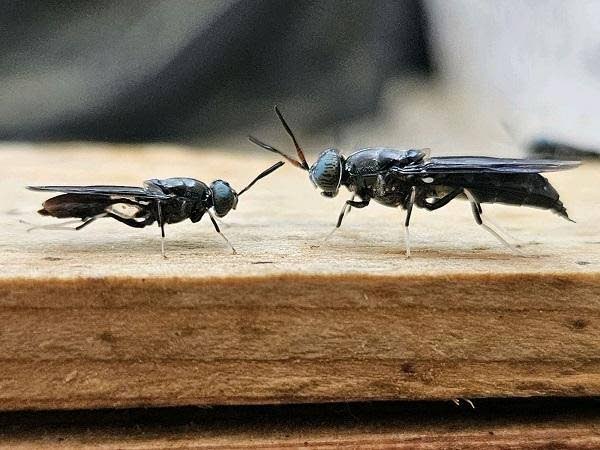UWI to produce local protein from flies for animal feed

THE University of the West Indies, St Augustine (UWI), has developed an innovative project to address the high costs of animal feed through its Black Soldier Fly (BSF) Production Facility at the UWI Field Station, St Augustine.
The facility was launched on November 25.
The project includes using the local species of fly as well as organic waste.
Developed jointly between UWI and the UN Food and Agriculture Organisation (FAO), it builds on technology developed in the UK and adapted to local conditions.
Graduate student Rakesh Bhukal said the larval stages of the fly can be found around chicken farms. He said he was able to find them at his cousin’s chicken farm in Princes Town and developed a colony in his apartment through trial and error.
“There are many flies that look like the BSF, both in larval and adult stages, so I had to nitpick through maggots. Once we were able to isolate them, we fed them on rotting fruit and vegetable waste, strained out the maggots, separated the life-cycle stages and put the fifth stage in a cage so all the adults hatched at the same time.”
He said the flies themselves do not feed, but drink water, which aids in their reproductive cycle. He said once the breeding colony is established, the larval stages are the ones that process food waste. The final stage before adulthood is the pupa, which can be harvested for use in animal feed.
The byproduct produced by the larvae, called frass, can be used to enrich soil.
Graduate student Nikel Rampardarath said organic waste comprises 22 per cent of TT’s waste that goes to landfills. As part of his research, he collected kitchen, fruit and vegetable waste from farmers and households, and ground or pulverised it to feed to the larvae. He said 300 grammes of six-day old larvae consume 12 kilogrammes of waste in their life cycle.
Graduate student Stephen Jairam focused on the operation of the facility. He said all the equipment used was low-cost and easily accessible, including mesh laundry baskets, plastic food containers, small chips of wood and food waste.
The FAO estimates one-third of all global food produced is lost or wasted between farm and fork.
Faculty of Food and Agriculture dean Prof Mark Wuddivira said the Caribbean region experiences some of the highest rates of food insecurity worldwide, affecting 26.5 per cent of the population in 2020 and 30.5 per cent in 2021.
“TT’s food import bill is upwards of $7.2 billion and upwards of US$5 million in the region. Livestock feed costs comprise up to 70 per cent of production expenses for livestock. The Caribbean’s agricultural sector must innovate.”
He said the covid19 pandemic and climate change had shown the vulnerabilities of external supply chains, and these realities called for local, resilient and sustainable solutions.
“This project aims to deliver those. Insect protein as produced by the black solider fly has the potential to revolutionise our agricultural sector. As a high-quality locally produced protein for poultry and aquaculture, this solution addresses multiple priorities: it transforms organic waste into a valuable resource, reducing environmental harm, and promoting circular economies; it significantly lowers dependency on costly imported feed, thus enhancing the region’s economic resilience; and it contributes to Caricom’s agri-food systems strategy and the goal of reducing our food import bill by 25 per cent by 2025.”
Dr Maureen Wakefield of Fera Science, a leader in insect bio-conversion in the UK, said insects make good sources of protein, and the by-products have been found to be highly digestible for livestock. She said there was no waste produced in the process.
Agriculture, Land and Fisheries Ministry focal point Roshni Ramsingh said the ministry was focused on creating an enabling environment for expansion of the programme, providing training, technical support, and most importantly, advocating for acceptance by the population.
Agriculture, Land and Fisheries Ministry chief technical officer Dr Michele Mellowes said one million chickens are eaten in TT yearly, and having a local source of feed would reduce the food import bill. She said organic waste can be recycled, reducing the amount of waste in landfills and methane gas production.
FAO representative Tania Hoost said the programme, which had been carried out in TT over the last two years, was being expanded to Barbados and Grenada.
UWI lecturer Dr Ronald Roopnarine said the university would be meeting with stakeholders to determine the next steps in developing the facility.

Comments
"UWI to produce local protein from flies for animal feed"